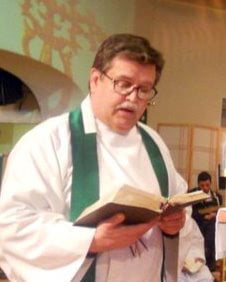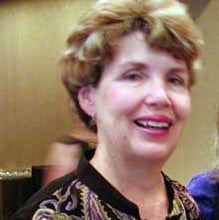Spiritually Speaking answers personal questions and concerns with a spiritual perspective. Local religious leaders that will take part in the discussion include Bryan Griem of Montrose Community Church; Jon Karn of Light on the Corner Church; Kimberlie Zakarian of Holy House Ministries; Skip Lindeman of La Cañada Congregational United Church of Christ; Rabbi Simcha Backman of Chabad of Glendale; Levent Akbarut of Islamic Congregation of La Cañada Flintridge; Betty Stapleford of Unitarian Universalist; Paige Eaves CV United Methodist Church; Bryan Jones of St. Luke’s of the Mountains Episcopal Church; Steven Van Meter and Beverly Craig of La Crescenta Center for Spiritual Living and Sharon Weisman, self described atheist/agnostic/secular humanist/free thinker. We welcome your questions and comments. Email us at spiritual@cvweekly.com.
Responses are offered from the perspectives of individual clergy members, which may or may not be in agreement with other respondents of Spiritually Speaking nor the editor and staff of the Crescenta Valley Weekly.
I love my family at a distance; however, whenever we get together for holidays, there is always arguments and bickering, most of the time because of too much drinking. A family gathering is planned for Easter and I don’t want to go.
Should I just go and pretend I’m having a good time? I sometimes think I should alienate myself from the family altogether.
– Confused in Montrose
Dear Confused in Montrose:
Alienation is an easy way for us to reduce our confusion, but it is often an impulsive decision to a situation that deserves careful emotional and spiritual thought. In psychology, alienation is also called a “cut off.” Cut offs happen when we do not know how to handle a situation emotionally, so we take the easy way out. But alienation, or cut off, is never healthy.
It is better to come to a reasonable, thought-out plan of having a relationship with your family. This includes strong boundaries – so you are comfortable as well. One of the greatest lessons I learned in my training to become a Marriage and Family Therapist at Fuller Seminary, that was a bit different from how my thoughts as a pastor, is this: If someone is physically or emotionally dangerous to you or your family, it is our moral obligation to protect and not be in relationship with them. Period. But if family members simply make us uncomfortable, or we do not agree completely with their lifestyle, etc. we need to find some common ground with which to have relationship.
If we cut off everyone who makes us uncomfortable or does not fit into our moral framework we face a few unhealthy results. One, we lose our ability to be a light. Even Jesus fellowshipped with those who did not fit His ideal of holiness. Two, we will most likely find ourselves alone in life – inflexible and unable to accept others. And three, not every aspect of a human being who makes us uncomfortable is bad. We have much to learn from those around us – even those that do not share our faith! We often learn humility, not to judge, to see good qualities in others that we lack, thus discovering areas of our lives that may not grow if we cut people off.
So as far as Easter goes, I would make a compromise with yourself. Set strong boundaries that make it tolerable for you to fellowship with your family. In other words, it does not have to be a cut off or suffer. All or nothing thinking is also unhealthy. Instead, it can be a relationship with boundaries, because Christ created us for reciprocating relationships, not isolation.
Ways to set boundaries are to give yourself a time limit with your family that day. Show them love and respect during that short period of time. Then plan something that fits into your idea of a peaceful and happy day before or after the family gathering. Set boundaries with any individual that is trying to cross any line with you, by speaking directly to the issue. For example, if you don’t drink and Uncle Henry keeps asking you if you would like a drink, say it straight with kindness and maturity: “Uncle Henry, thanks. But I don’t drink. I am so thankful you can respect that.” Also be prepared to leave if it gets out of hand, but try to inform a family member ahead of time of this boundary. For example, tell mom you dislike the drinking and arguing within the family but you love them. However, if it gets chaotic you are just going to excuse yourself and leave for the day. This tactic will enable you to love your family, keep connection, but also protect yourself. And remember, you are never obligated to accept the presence of dangerous people.
The Rev. Kimberlie Zakarian is a Licensed Marriage and Family Therapist in Montrose. Reach her at Kimberlie Zakarian Therapy, 2233 Honolulu Ave, Suite 310, Montrose, CA 91020, or by email at Kimberlie@kimberliezakariantherapy.com.
Dear Confused,
Is it just at holiday gatherings that you find being with your family painful? I sense that since you say, “I sometimes think I should alienate myself from the family altogether,” it is generally hard for you to be with your family up close.
Not knowing you or your family it is hard to give you definitive answers and specific advice. But what I really want to do is encourage you to consider the possibility that your family has the disease alcoholism. Both drinking and non-drinking members of alcoholic families suffer from the effects of “too much drinking.”
Al-Anon is a wonderful spiritual organization for family and friends of alcoholics. It would be a great group for you to start exploring these questions about your family.
One of the chief symptoms of this illness is what’s called “denial,” which is pretending everything is fine and nothing painful or destructive is happening. So whether you decide to go or stay away from your family’s Easter gathering, you might try being honest. You can tell them you don’t like all the drinking that leads to all the arguments and bickering.
God Bless You and good luck.
The Rev. Bryan Jones is vicar of St. Luke’s of the Mountains Episcopal Church, La Crescenta
bryjones@aol.com.
Question:
Our 19-year-old daughter told us that she’ll be moving out of state for the summer and would return in August. She is only 12 credits from her first degree. She told us that she’s been dating a man since January who is 14 years older than she is. Although they’ve been dating for three months, we were just told about it; however she has met his parents. I guess we are lucky she didn’t just send us a postcard from another state.
He’s in construction and recently took a large job in the state where she will be for the summer and has offered her a laborer’s job on the construction crew. We are stunned, and out of breath. Her father and I listened to her for over an hour, very quietly. We did have a nice lengthy discussion, we told her that we want what she wants, but that she had to fully examine this 14 year gap between her and her boyfriend. What is our responsibility in this situation?
– Concerned parents in Glendale
Dear Concerned,
Spiritually speaking, there is no biblical instruction either condoning or forbidding a marriage of age gap. I had a girlfriend myself, long ago, that was just less than a decade younger than I. It was exciting, but not lasting; at least not so far as marriage. She’s still my friend. However, if shacking up without the ring is the concern, then just quietly listening won’t do, parents. The Bible says, “Marriage should be honored by all, and the marriage bed kept pure, for God will judge the adulterer and all the sexually immoral” (Hebrews 13:4). Besides this, as a grown man and a father I would be concerned with a 14 year stretch between my consenting child and her potential suitor. That’s because there is so much common life that cannot be shared between the two. One glaring fact of any equal marriage is that the man has more chance than not of meeting his Maker first. Men have a classic benefit of looking slightly younger than their years on the outside, but they possess the unsavory reality that inwardly they are aged more than their female counterparts. Yep, a woman and man of same chronology may look different, but the man will probably die first.
Now imagine that the woman is soooooo much younger than her man. She will witness his passing, then she will live in senior solitude for the rest of her born days, however torturously long that may be.
A similar scenario happened to my sainted granny. God does say something about our spiritual unity, and it goes thus, “Do not be yoked together with unbelievers” (2Corinthians 6:14). In other words, do not hook up with people that don’t hold your same spiritual values. If theirs are contrary to yours, you will have major problems.
Certainly you want to know if your love interest does more than warm your immediate cockles. Does he or she share your goals in life? Do they enjoy the same things: music, entertainment, food? Most importantly, do they share your faith? That question is pregnant with serious ramifications and the answer is not merely one of checking a box, it’s one of filling in the blanks. They might say they believe in Jesus, but which Jesus? They might say they’re Christian, but what does that mean, deep down? Church attendance, child rearing, and moral decision-making all depend on how the question is answered, and if parents can at least stir the pot with regard to such concerns (including the ring) then they’ve contributed their fair share and may console themselves with the fact that the most important bases were covered – no matter how this thing turns out.
Pastor Bryan Griem
is pastor of Montrose Community Church,
MontroseCommunity@sbcglobal.net
Dear Concerned Parents,
As the parent of four grown children and a pastoral counselor, I have the greatest empathy for you and the concerns you have about your daughter’s choices for the summer and her serious relationship with a man who is 14 years older than she is. We all want the best for children, and that includes the decisions they make about romantic connections. We certainly don’t want them to be hurt even when they are adults.
Let me say that I commend you for taking over an hour to talk with your daughter and listen to her. I am just sorry she did not let you in on her plans and her relationship with this young man sooner. I encourage you to continue discussion with her and to support her ongoing discernment in the matter. And please do not take a stance of stern opposition to this relationship, something that is likely to bring about a reinforcement of your daughter’s position in her boyfriend’s favor.
You say that she has met the young man’s parents. This would certainly be a good time to ask her to invite him to meet you. You may find that he is someone you can truly appreciate. If not, you have at least shown your openness to a potential connection. Such a meeting could also provide your daughter with the opportunity to see how he fits in with the people who have raised her and supported her in getting a further education.
In addition, you could suggest that she talk with some other adult about her plans. Perhaps there is family friend, a teacher, or counselor whom she admires. You could even ask if she would be willing to see a psychologist to help her with clarity. Or, if you are connected to a faith community, she could speak with the pastor of that congregation. However because she may not believe she has a problem that needs to be solved, these suggestions would need to be broached sensitively.
My hope for you is that you and your daughter will find a way to navigate this situation that will strengthen your relationship with her and give her the tools she needs to grow into a clear-thinking adult. I will be keeping you in my thoughts and prayers, and I encourage you to tap into your own spiritual resources for your continued journey as parents – a journey that lasts a lifetime.
Rev. Dr. Betty Stapleford
Minister of the Unitarian Universalist
Church of the Verdugo Hills
La Crescenta
Bstaple4d@aol.com




